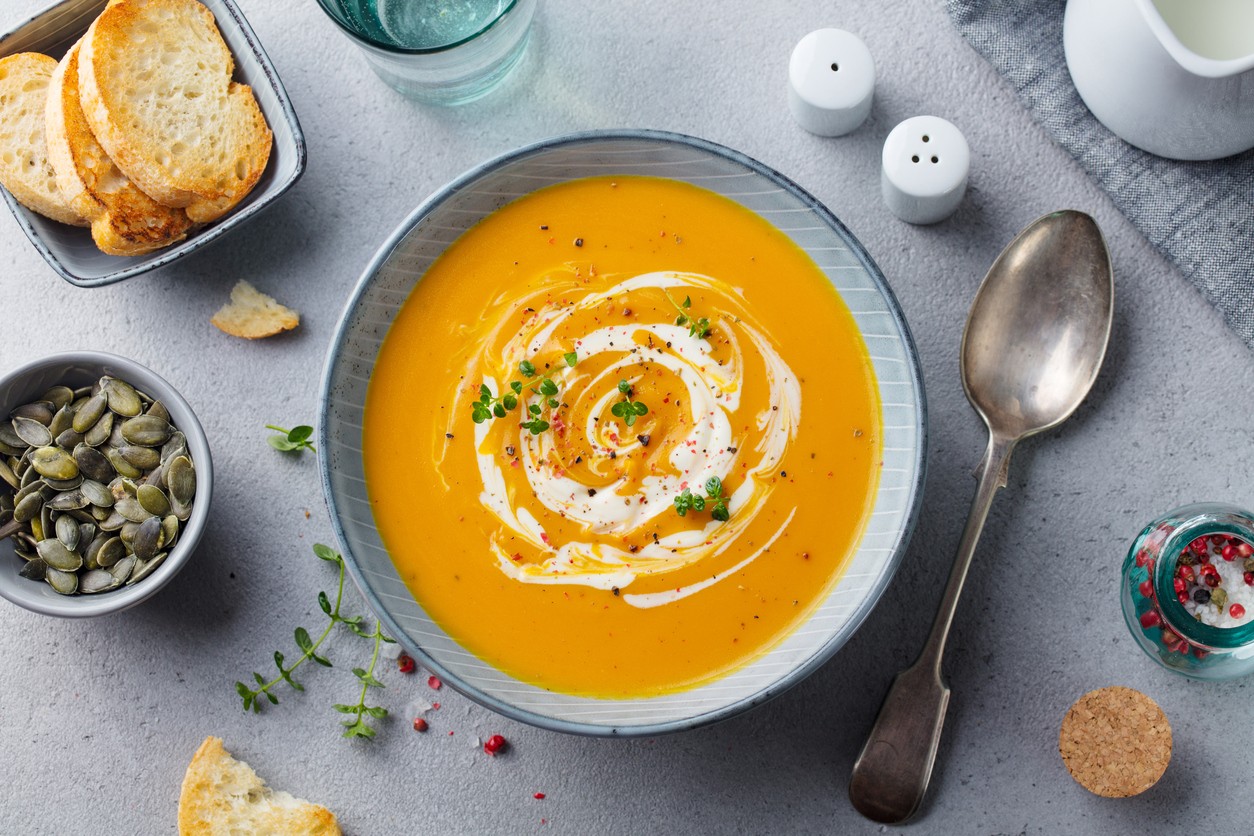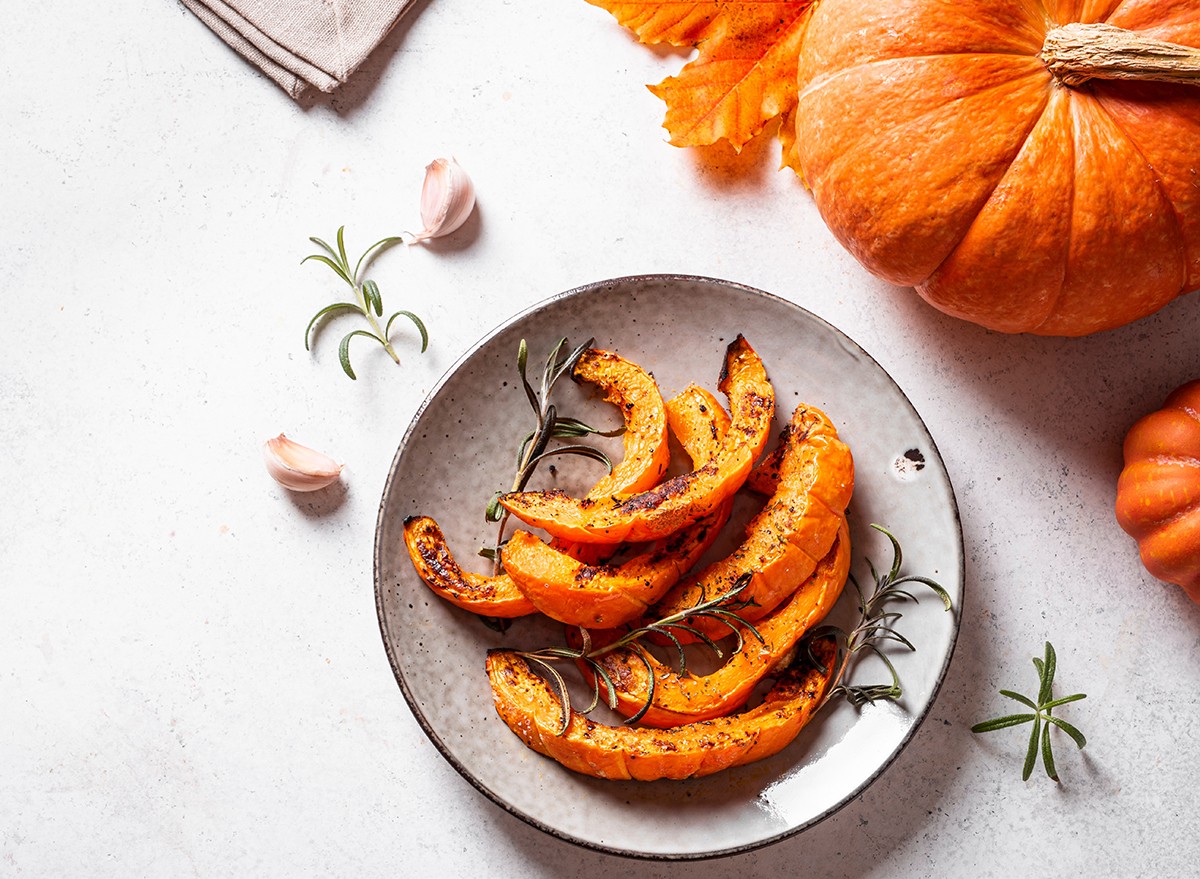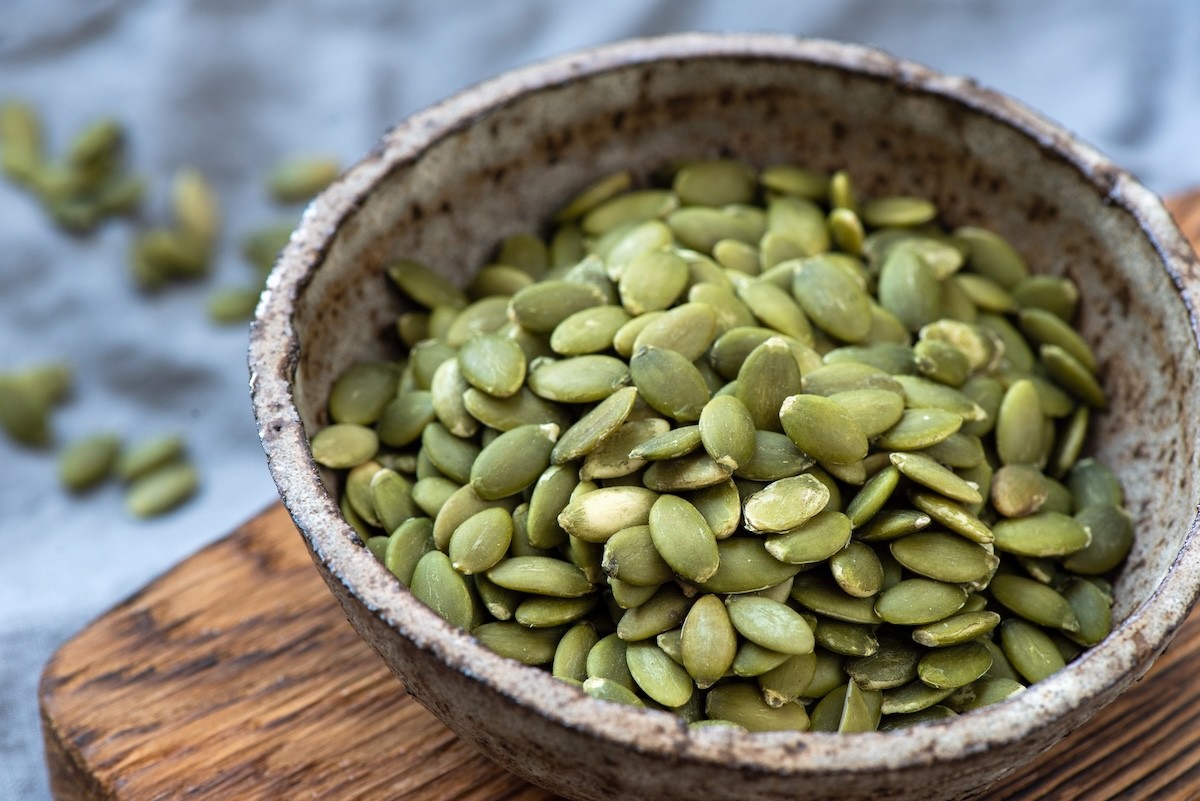3 Amazing Health Benefits of Eating Pumpkin, According to a Registered Dietitian

Apple crisp lovers will beg to differ, but fall is pumpkin territory. The fruit (yes, pumpkin is a fruit!) is everywhere, from the lattes we drink to our favorite baked goods. You don’t need us to tell you that pumpkins are scrumdiddlyumptious, but do you know about all the amazing health benefits of pumpkins?
“I like to say pumpkin is a fall superfood because it is extremely nutrient-dense. It is a good source of fiber, magnesium, and also three vitamins that I am obsessed with, vitamins A, C, and E,” Maggie Michalczyk, RD, a registered dietitian and wellness advisor at New Chapter, tells Best Life.
But, of course, we aren’t talking about PSL lattes here. Unfortunately, you aren’t going to reap these health benefits from sugary pumpkin syrups or processed pumpkin-flavored frozen meals.
“A can of 100 percent pure pumpkin is what you want to look for at the grocery store,” says Michalczyk, who also writes her own pumpkin food blog called Once Upon a Pumpkin. And here are the biggest nutritional benefits.
RELATED: 6 Cozy Meals You Can Serve Out of a Pumpkin.
1. Pumpkin can lead to healthier skin.

Pumpkin is packed with vitamins A, C, and E—”really important antioxidants for our skin,” says Michalczyk.
As Korean skincare brand Wishtrend explains, these three vitamins are widely referred to as “the holy trinity of skincare.” Together, they help promote skin cell turnover, boost collagen production, reduce hyperpigmentation and scarring, and protect against potential UV damage, among other amazing skincare benefits.
Another fun tidbit about pumpkin: Vitamin A is also responsible for its bright orange coloring, Michalczyk shares.
2. Pumpkin is a great source of fiber.

Pumpkin is also an excellent source of potassium and fiber. Consuming more fiber can help regulate bowel movements (and prevent constipation), lower your risk of diabetes and heart disease, and stabilize blood sugar and cholesterol levels, per Mayo Clinic.
“A lot of us are trying to get more fiber in our diets, and that can be hard,” continues Michalczyk. “I always say to have a can of pumpkin in your pantry year-round, not just in the fall.”
To that point, Michalczyk shares that some of her favorite pumpkin food creations lean more savory than sweet. She loves whipping up pumpkin smoothies and pumpkin snack bites. However, her kryptonite is pumpkin sauce in all its delicious forms, more specifically, her Pumpkin Cacio e Pepe recipe and Marry Me Pumpkin Chicken recipe.
However, if she does have a sweet tooth, Michalczyk says she’ll whip up pumpkin muffins or pumpkin-inspired oat bars.
RELATED: Adding This Seasonal Superfood to Your Diet Can Help You Lose Weight.
3. The magnesium in pumpkin seeds can aid cellular function.

Michalczyk says pumpkin seeds are also full of nutritional value, including healthy fats and zinc.
Green pepitas are a type of pumpkin seed brimming with magnesium, an important nutrient that regulates muscle and nerve function, blood pressure, and healthy bones.
“Magnesium is needed for every single cell in our bodies,” explains Michalczyk, adding that it’s also “really good for stress support, rest, and recovery.”
Fortunately, pumpkin seeds are super easy to sneak into your diet. You can add them to trail mix, salsas, hummus, salads, and homemade granola bars, or use them as a topping on roasted veggies, baked salmon, and even desserts.
But if you’re magnesium deficient or battling high stress, you might need to increase your magnesium intake beyond a handful of pepitas.
“If you’re going through an extremely stressed-out period of time, it’s safe to say your magnesium [levels] are low or will be low because stress really depletes our magnesium,” says Michalczyk. “A lot of us are not getting enough magnesium in general, so adding a supplement to your routine is a great way to do that.” Of course, always speak with your healthcare provider before starting any new supplement.
Whether you’re munching on pepitas or blending together a pumpkin pasta sauce, you’re reaping the health (and skincare) benefits of pumpkin. And autumn is the perfect time to start!
“Lean into seasonal produce! As a dietitian, I never try to be like, ‘I’m a perfect eater.’ I don’t think that exists,” Michalczyk tells Best Life. “I think it’s safe to say we all do our best, but we need help, too, at the end of the day. So I think seasonal foods like pumpkin and a supplement can really work in conjunction with one another.”